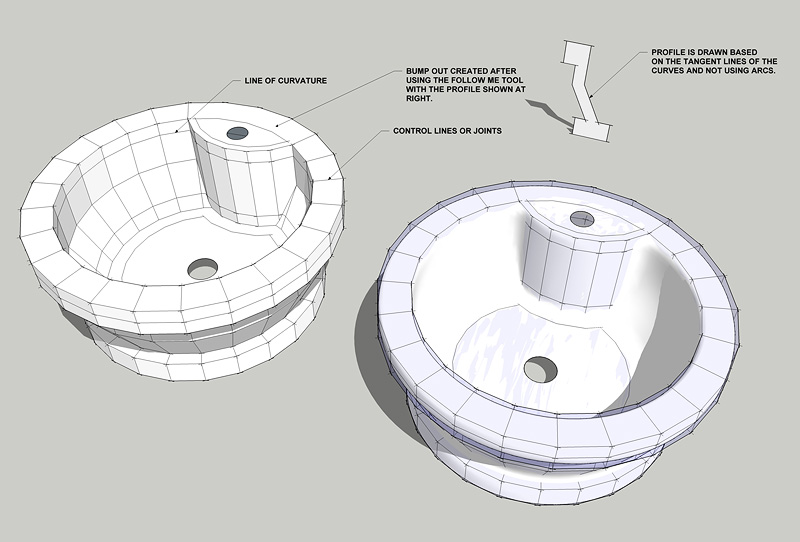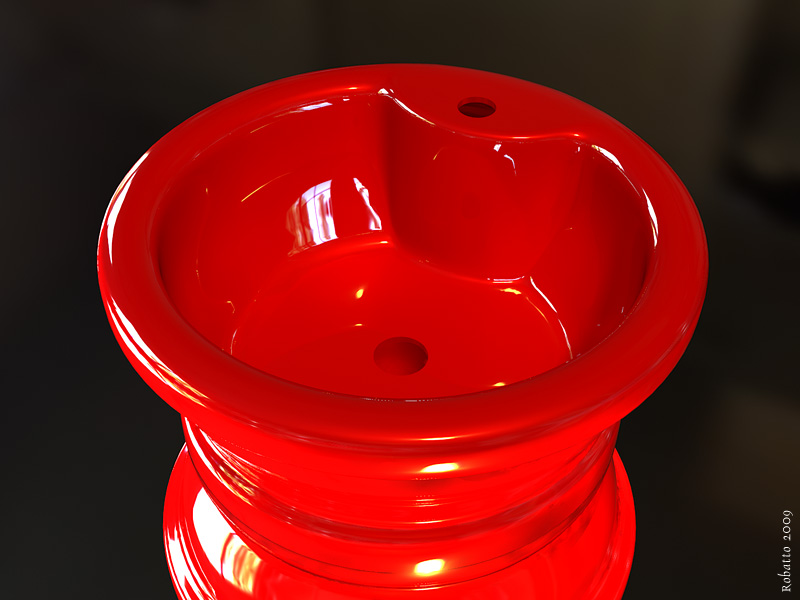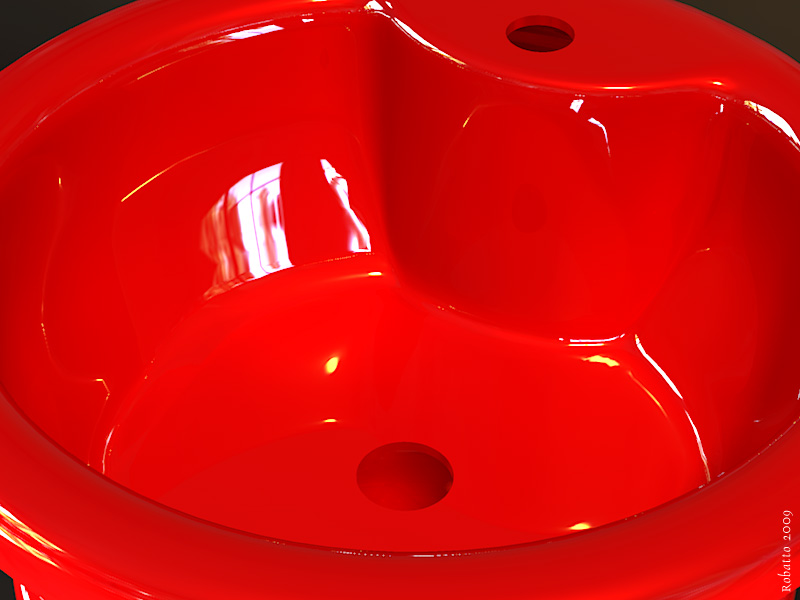SU or ...? for hard surface modeling
-
@solo said:
Thanks chris, here is one with faucet turned on. (if I remember correctly you did something similar using Podium)
The water is brilliant! And thanks for the details on your method--it's essentially what I came up with myself (ie the lathe operation and intersecting I mentioned). It's certainly acceptable, but not perfect, with the main culprit being the sharp edge where the bumpout meets the bowl of the sink (as kwistenbiebel noted).
I hadn't thought using follow me, as dale mentioned (thx for the tip!), so I'll give that a try, although merging this with the rim of the sink might be tricky. Solo, you mentioned "more bevelling" that could be done--were you referring to improving the bumpout/bowl join? The other annoying thing about the sink is that the profile of the bevel on the top edge of the bumpout is much different than the profile of the bevel around the perimeter of the sink, creating another (to me) difficult situation when these meet. It seemed like such a simple object when I began!
gksl4: Hexagon looks quite interesting: there's a Mac version, not to much $$, but I couldn't find a demo to try out. I'll do some more research and see what I can find.
karlfucious: silo does look interesting, but it seems to be heavily slanted toward pure organic form and character creation, no? Would it be suitable to creating objects with purely regular (although somewhat complex) shapes? Whatever the case, the intro/tutorials on their website have made me look at my bank account closely. As spectacular as sketchyFFD is, to see the tweak tool (I think) in operation was amazing!
-
I did some bevelling where the 'bulge' meets the sink, I should have done some more as it's not very noticable, but my point being that SU can be used to model almost anything if one tries.
Are you needing this for a product display or is it for a bathroom design? If indeed it is for a product then I understand your need to total accuracy, and would suggest using the blue prints to get the dimensions right and maybe even using Rhino for the modeling. It looks very much like the Kohler Botticelli brand BTW.Anyway, one last render (was playing)
-
that water splash looks more advanced than mine.
Is the splash itself also done using Skeytchup? (an extrude of a bezier curve, triangulating and subdividing it with the Subdivide'nd Smooth plugin?) -


Like Kwistenbiebel, I would also like to learn more about how you've done the water splash, Pete..!!
PLEASE...!!
-
@solo said:
Are you needing this for a product display or is it for a bathroom design? If indeed it is for a product then I understand your need to total accuracy, and would suggest using the blue prints to get the dimensions right and maybe even using Rhino for the modeling. It looks very much like the Kohler Botticelli brand BTW.
Thanks for the great renders--you spent much more time/effort than you should have. The sink is for a bathroom design and I agree that total accuracy is not needed for this project. The real motivation for my post, which I should have made clearer, was to find out if there was an equivalent to SketchUp for this kind of modeling--in other words, an easy to use and learn program that handles beveling, filleting and merging complex curves as easily as SketchUp handles rectilinear forms (and many curved ones). The more I look, however, the more it seems that SketchUp is truly unique in its combination of usability and capability. SketchUp will remain my modeling workhouse, but I'm trying to see what (if anything) I should add to my workflow to make life easier when encountering "difficult" objects that SU doesn't natively handle well. I see Rhino has demo and is working on a Mac OS version, so perhaps I'll spend some time on it.
-
That water looks very good Pete.

-
@rustyshack said:
...in other words, an easy to use and learn program that handles beveling, filleting and merging complex curves as easily as SketchUp handles rectilinear forms (and many curved ones)....
check ViaCAD Pro f. Win/OSX, a feature-based NURBS surface and volume modeler w/ intuitive user interface, history tree as well as all common vector-based CAD filters incl. a SU import:

2D / 3D CAD and Drafting Software | CAD Software for Mac and Windows | CAD Programs | Drawing Software | Architecture Design Software
2D / 3D CAD and Drafting Software, CAD Software for Mac and Windows, CAD Programs, Drawing Software, Architecture Design Software
(www.punchcad.com)
imho THE sleeper in this price range (MSRP 250 U$)
have fun,
Norbert -
Rusty,
This actually can be done using subdivide and smooth. I experimented with some techniques I've already been trying and came up with a rather simple method using not the actual curves of the sink but the tangent lines of the curves. I used a circle for the plan layout with 24 segments. You can also use a polygon as long as the legs reflect the tangent lines of either a circle or elipse.

You also have to place control lines here and there as shown on the image and the attached skp file. These will go at the point of curvature for the arcs of the profile, etc.
Here's the skp for you or anyone else to study.
This is using a circle. However, you can do this with an oval or an ellipse. It can also be done using 1/2 of a basic polygon.
I'm generating a KT rendering and should have one up any minute now.
Gus
-
Here's the KT render. You should be able to see the fillet at the junction of the bump out and the basin.


Gus
-
Nice one, Gus!

-
Thank you Gaieus. Guess my insomnia serves a purpose.

-
Yes great work folks, I knew this would be a fun one to watch.

-
@unknownuser said:
Gus ....you nailed it!! cheers to you!!
I agree--that looks spectacular and relatively easy to model. When I tried using subdivide and smooth initially, I could not figure out how to control the subdivision. I was trying to draw elaborate grids etc etc and nothing seemed to work. Never occurred to me that a few well-placed control lines like the ones in your model would do the job.
I will give this a go later today and see how it goes.
-
Oh yeah, Gus got it pretty right!

Remember me saying it looks like a Kohler Botticelli?, well out of curiousity I went to the Kohler site and there it was, I attach a link below, scroll down and click on the 'for installers and designers' tab and a .dwg becomes available for download, it's the actual model which can be opened up in SU for you to use.
Enjoy.
http://www.us.kohler.com/onlinecatalog/detail.jsp?item=8038302§ion=2&category=16
OMG!!! see the price

-
Thanks guys. Pete, thanks for the link. I might try doing one to scale later since this one was eyeballed.
Modelhead, for another $500 you can also get one (1) towel bar. Throw in a tooth brush/cup holder for another $500 and you can have all three for $6,000!

-
"$3,286.00 and up" Fruitcakes.

Gus, Pete: cool tuts. Thanks.
-
Stinkie, thanks.
Pete, great work by the way as usual. So, how did you make the water?
Gus
-
I hope I am not hijacking this thread, I believe the issue of the basin is solved so here is how I do splashes:
I have made these before and posted someplace on this forum. Anyway I use SDS and FFD to create the shape (nothing fancy there) however SDS can increase the poly count to something unusable in SU so be careful.
I normally make it in SU then export to Vue and texture it there and save it as an object for later use.Here is a snap of a very simple one I created today as an example, I deleted the .skp of the one used on the first page as I saved it as a .vob (Vue object) so there was no need to keep the SU one which was very high poly anyway.
And if you want i attached the .skp too. -
Thanks Pete. This is helpful. I was working on creating a splashfoot for a waterfall right before I came across this thread. Funny how life works.
-
Yeah... Thanks a lot, Pete..!!

Much appreciated..!!
Advertisement










